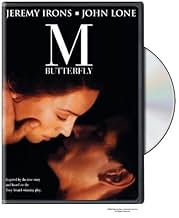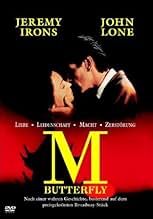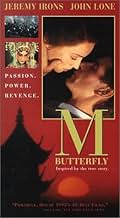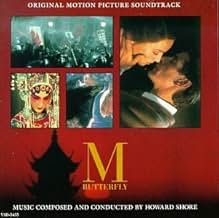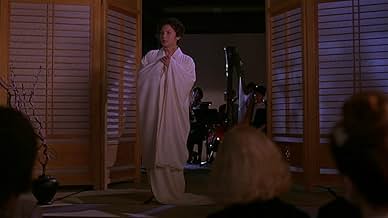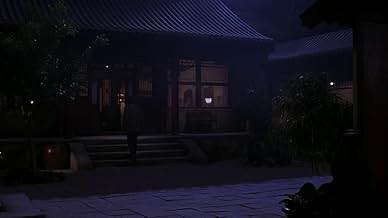CALIFICACIÓN DE IMDb
6.7/10
11 k
TU CALIFICACIÓN
En la década de 1960 en China, el diplomático francés Rene Gallimard se enamora de una cantante de ópera, Song Liling, pero Song no es quien piensa Gallimard.En la década de 1960 en China, el diplomático francés Rene Gallimard se enamora de una cantante de ópera, Song Liling, pero Song no es quien piensa Gallimard.En la década de 1960 en China, el diplomático francés Rene Gallimard se enamora de una cantante de ópera, Song Liling, pero Song no es quien piensa Gallimard.
- Premios
- 1 premio ganado y 1 nominación en total
Opiniones destacadas
Jeremy Irons and John Lone (who plays the character, Song Liling) should both have gotten academy awards for their performance in this incredibly enigmatic and captivating scorcher of a movie. This is a completely new twist on on the classic opera and may even be more of a believable story because it is so creatively wicked. It has a sexual tension that holds throughout the whole movie and is entirely played out in the mind and sensuously mesmerizing at the same time.
It's an emotionally tortuous journey that Jeremy Irons makes in the name of love (?), and more likely addicted passion. John Lone's performance is exceptional as one who is just as driven and hooked psychologically in his own way as what it is in him that drives him to fulfill Jeremy's ecstasy and descent into irretrievable madness.
Definitely one of the best movies ever! I hope this makes it to DVD sometime soon as it surely deserves to be seen again and again.
It's an emotionally tortuous journey that Jeremy Irons makes in the name of love (?), and more likely addicted passion. John Lone's performance is exceptional as one who is just as driven and hooked psychologically in his own way as what it is in him that drives him to fulfill Jeremy's ecstasy and descent into irretrievable madness.
Definitely one of the best movies ever! I hope this makes it to DVD sometime soon as it surely deserves to be seen again and again.
The shock and awe of his particular brand of horror might be what put Cronenberg on the map, but the qualities of any great director can't be boxed in by genre. This is decidedly the case with Cronenberg.
This seemingly straight forward spy drama, is the perfect framework for the Cronenbergian exploration of omnisexuality and man's ability to evolve beyond convention and conviction, into something uniquely other and uniquely beautiful. It's the emotional equivalent to his body horror movies, and as such distinctly different but nonetheless familiar.
Having seen all but his latest movie, I find it safe to say that David Cronenberg is the most fascinating and continually surprising director I have ever encountered. I simply love that crazy old guy.
This seemingly straight forward spy drama, is the perfect framework for the Cronenbergian exploration of omnisexuality and man's ability to evolve beyond convention and conviction, into something uniquely other and uniquely beautiful. It's the emotional equivalent to his body horror movies, and as such distinctly different but nonetheless familiar.
Having seen all but his latest movie, I find it safe to say that David Cronenberg is the most fascinating and continually surprising director I have ever encountered. I simply love that crazy old guy.
M. BUTTERFLY continues to rank among the more important cinematic adaptations of a brilliant play - this one by the playwright David Henry Hwang. Having the pleasure to see two productions of the play - New York and Los Angeles - and viewing the film (1993) in the theater and on DVD brings an immense amount of satisfaction of just how fine this work is and continues to satisfy. The fact that David Henry Hwang wrote the screenplay suggests how true to the original the film is and how much of an impact it makes on the viewer
M. BUTTERFLY is based on a true story that stunned the world. During the Cultural Revolution in China in the mid-1960s, a French diplomat René Gallimard (a brilliant portrayal by Jeremy Irons) falls in love with a Chinese opera singer Song Liling (John Lone) - women were never allowed to sing in the Beijing Opera so the fact that Song is a man is credible. Song Liling touches him with a love as vivid, as seductive--and as elusive--as a butterfly. The love affair is so fragile and respectful that René does not suspect that Song is a man in disguise. René Is an important diplomat with the French Embassy, married to Jeanne (Barbara Sukowa), and is responsible for maintaining the high standards of diplomacy. Song Liling has been placed in the position of an undercover agent to gather secrets from the Embassy about the American plans in Vietnam. As René is promoted he demands to see his M. Butterfly without her clothes, an Song's only protection about her gender identity is to reveal that she is pregnant with René's child and must leave to be with her family until the child is born. As the Cultural Revolution heightens the French Embassy is to be diminished and it is discovered that René has been in a liaison with with a Chinese spy and is sent back to France to be imprisoned. When he is put on trial Song appears in Paris to be placed on the witness stand and since years have passed since their last meeting, Song attempts to offer herself once again to be René's Butterfly. Whether or not René's passion was a flight of fancy, it sparked the most vigorous emotions of his life. Only in real life could love become so unreal. And only in such a dramatic tour de force do we learn how a fantasy can become a man's mistress--as well as his jailer. In a desperately touching final scene we see the imprisoned René perform the final act from the opera that has accompanied this film - Puccini's MADAMA BUTTERFLY.
The story is at once compelling, explosive and slyly humorous, 'a work of unrivaled brilliance, illuminating the conflict between men and women, the differences between East and West, racial stereotypes--and the shadows we cast around our most cherished illusions.' The musical score by Howard Shore integrates arias and choruses from Puccini's opera with music from Chinese opera and his own sensuously beautiful original musical score. David Cronenberg directs with the tight amount of surreal disbelief the piece needs, but it is the brilliant acting of Jeremy Irons and John Lone that illuminate this film. It is a masterwork.
Grady Harp
M. BUTTERFLY is based on a true story that stunned the world. During the Cultural Revolution in China in the mid-1960s, a French diplomat René Gallimard (a brilliant portrayal by Jeremy Irons) falls in love with a Chinese opera singer Song Liling (John Lone) - women were never allowed to sing in the Beijing Opera so the fact that Song is a man is credible. Song Liling touches him with a love as vivid, as seductive--and as elusive--as a butterfly. The love affair is so fragile and respectful that René does not suspect that Song is a man in disguise. René Is an important diplomat with the French Embassy, married to Jeanne (Barbara Sukowa), and is responsible for maintaining the high standards of diplomacy. Song Liling has been placed in the position of an undercover agent to gather secrets from the Embassy about the American plans in Vietnam. As René is promoted he demands to see his M. Butterfly without her clothes, an Song's only protection about her gender identity is to reveal that she is pregnant with René's child and must leave to be with her family until the child is born. As the Cultural Revolution heightens the French Embassy is to be diminished and it is discovered that René has been in a liaison with with a Chinese spy and is sent back to France to be imprisoned. When he is put on trial Song appears in Paris to be placed on the witness stand and since years have passed since their last meeting, Song attempts to offer herself once again to be René's Butterfly. Whether or not René's passion was a flight of fancy, it sparked the most vigorous emotions of his life. Only in real life could love become so unreal. And only in such a dramatic tour de force do we learn how a fantasy can become a man's mistress--as well as his jailer. In a desperately touching final scene we see the imprisoned René perform the final act from the opera that has accompanied this film - Puccini's MADAMA BUTTERFLY.
The story is at once compelling, explosive and slyly humorous, 'a work of unrivaled brilliance, illuminating the conflict between men and women, the differences between East and West, racial stereotypes--and the shadows we cast around our most cherished illusions.' The musical score by Howard Shore integrates arias and choruses from Puccini's opera with music from Chinese opera and his own sensuously beautiful original musical score. David Cronenberg directs with the tight amount of surreal disbelief the piece needs, but it is the brilliant acting of Jeremy Irons and John Lone that illuminate this film. It is a masterwork.
Grady Harp
Jeremy Irons plays the lead role as French diplomat, Phillipe Bouriscot, who falls in love with an absolutely seductive Chinese woman opera singer (John Lone). As Irons pursues the diva he's attracted to, she toys with his foreign ignorance of the cultural differences between their Western & Eastern societies.
In a sense, she keeps the diplomat at a distance for 18 years while their affair continues by becoming his teacher of cultural difference. The romantic & erotic chemistry between the diplomat & opera singer is a very famous true story written by David Henry Hwang--"Madame Butterfly." There have been numerous stage & screen renditions of the story.
I like this (1994) version best because David Cronenberg is undoubtedly the finest director to deal with the most important topic in the story: gender bending. "M. Butterfly" is the Canadian Cronenberg's first Hollywood funded debut. The surprise plot of the sorted true love story is one of espionage. An adults only film, it is one of intrigue, sizzling romance, twists & turns, deception & betrayal.
In a sense, she keeps the diplomat at a distance for 18 years while their affair continues by becoming his teacher of cultural difference. The romantic & erotic chemistry between the diplomat & opera singer is a very famous true story written by David Henry Hwang--"Madame Butterfly." There have been numerous stage & screen renditions of the story.
I like this (1994) version best because David Cronenberg is undoubtedly the finest director to deal with the most important topic in the story: gender bending. "M. Butterfly" is the Canadian Cronenberg's first Hollywood funded debut. The surprise plot of the sorted true love story is one of espionage. An adults only film, it is one of intrigue, sizzling romance, twists & turns, deception & betrayal.
I've been searching for this film for a while. Having seen Videodrome, The Fly and Naked Lunch, I knew that Cronenberg was capable of making compelling, disturbing, horrific pieces which resonated in a dark, menacing way; staying with you via their visceral imagery and twisted ambiance. Having seen Dead Ringers, Spider and A Dangerous Method, I knew that Cronenberg also had another side to his work. A more restrained, mature, refined yet no less affecting style which, at its best, achieved a great level of tension without the visceral gore of his aforementioned works.
What I hadn't seen was M Butterfly. The almost unmentioned work which takes Cronenberg's more mature approach to filmmaking and fulfils his promise by giving him a jewel in what is an extremely impressive crown. I greatly enjoyed the movies I mentioned in the previous paragraph but even the best ones I felt were lacking something for me to be able to say they were a masterpiece. Perhaps they felt a little convoluted, gratuitously gory, or perhaps at times distant and even lifeless in some of his later works. But M Butterfly is none of these things; well some may say its plot is convoluted but, strangely enough, it's heavily based on a true story, or rather it's based on a novel which is based on a true story.
What M Butterfly has, which many of Cronenberg's other films lack, to varying degrees, is relatability and empathy. Pure, unadulterated empathy. It presents its characters not as good or bad; it's not interested in judging or condemning; it is a film which desires to take you deep into the world of an enchanted and tortured man: Rene Gallimard. It wishes to show you his most intimate passions and desires, his triumph, his awakening, his desperation and his suffering. It wishes to explore his self- realisation, his moments of greatest happiness and it wishes to show us his ultimate tragedy.
This is a film which echoes with symbolism. Its structure is tight, its performances, by the two leads, are heartbreakingly sublime. It is influenced by opera, by Hitchcockian psychological, twisted romance, think Vertigo. Its story opens and unfolds like a delicate rose which eventually must wilt and die. This is poetry, this is humanism. This is the most accomplished and meaningful work I've seen in a long time.
If you are even slightly tempted to investigate this then know that, despite its lack of recognition and a number of poor reviews, this film had the power to tantalise and haunt, in equal measure, at least one audience member. I was taken on a journey which I intimately understood only too profoundly. Perhaps it will mean something significant to you too.
What I hadn't seen was M Butterfly. The almost unmentioned work which takes Cronenberg's more mature approach to filmmaking and fulfils his promise by giving him a jewel in what is an extremely impressive crown. I greatly enjoyed the movies I mentioned in the previous paragraph but even the best ones I felt were lacking something for me to be able to say they were a masterpiece. Perhaps they felt a little convoluted, gratuitously gory, or perhaps at times distant and even lifeless in some of his later works. But M Butterfly is none of these things; well some may say its plot is convoluted but, strangely enough, it's heavily based on a true story, or rather it's based on a novel which is based on a true story.
What M Butterfly has, which many of Cronenberg's other films lack, to varying degrees, is relatability and empathy. Pure, unadulterated empathy. It presents its characters not as good or bad; it's not interested in judging or condemning; it is a film which desires to take you deep into the world of an enchanted and tortured man: Rene Gallimard. It wishes to show you his most intimate passions and desires, his triumph, his awakening, his desperation and his suffering. It wishes to explore his self- realisation, his moments of greatest happiness and it wishes to show us his ultimate tragedy.
This is a film which echoes with symbolism. Its structure is tight, its performances, by the two leads, are heartbreakingly sublime. It is influenced by opera, by Hitchcockian psychological, twisted romance, think Vertigo. Its story opens and unfolds like a delicate rose which eventually must wilt and die. This is poetry, this is humanism. This is the most accomplished and meaningful work I've seen in a long time.
If you are even slightly tempted to investigate this then know that, despite its lack of recognition and a number of poor reviews, this film had the power to tantalise and haunt, in equal measure, at least one audience member. I was taken on a journey which I intimately understood only too profoundly. Perhaps it will mean something significant to you too.
¿Sabías que…?
- TriviaDavid Cronenberg loved the play so much that when he heard a movie was being made about it, he volunteered immediately to direct it.
- ErroresThe word accordion is misspelled "accordian" in the closing credits.
- Citas
Song Liling: The days I spent with you were the only days I ever truly existed.
Selecciones populares
Inicia sesión para calificar y agrega a la lista de videos para obtener recomendaciones personalizadas
- How long is M. Butterfly?Con tecnología de Alexa
Detalles
Taquilla
- Presupuesto
- USD 17,000,000 (estimado)
- Total en EE. UU. y Canadá
- USD 1,498,795
- Fin de semana de estreno en EE. UU. y Canadá
- USD 57,280
- 3 oct 1993
- Total a nivel mundial
- USD 1,498,795
- Tiempo de ejecución1 hora 41 minutos
- Color
- Mezcla de sonido
- Relación de aspecto
- 1.85 : 1
Contribuir a esta página
Sugiere una edición o agrega el contenido que falta

Principales brechas de datos
What is the Brazilian Portuguese language plot outline for M. Butterfly (1993)?
Responda

